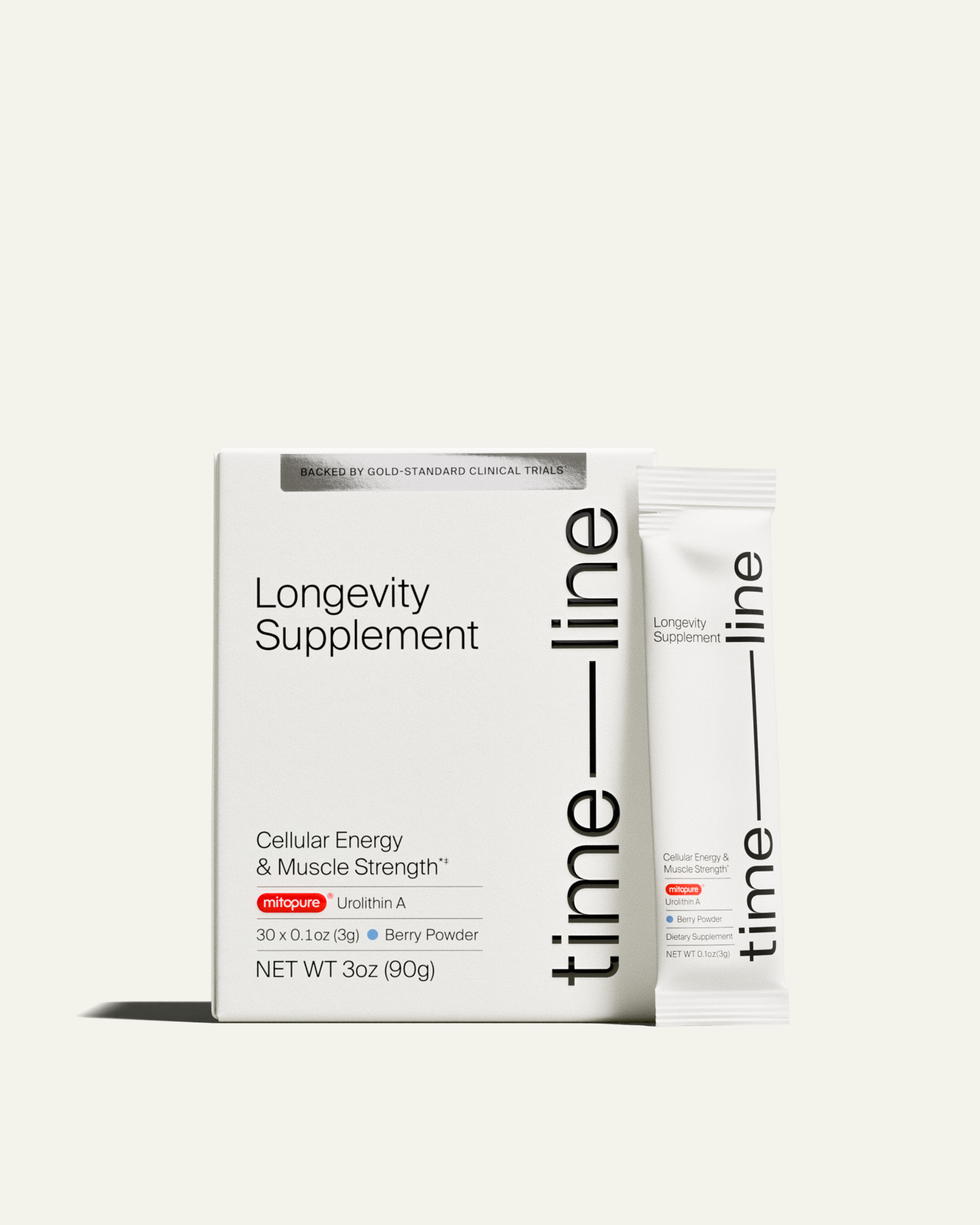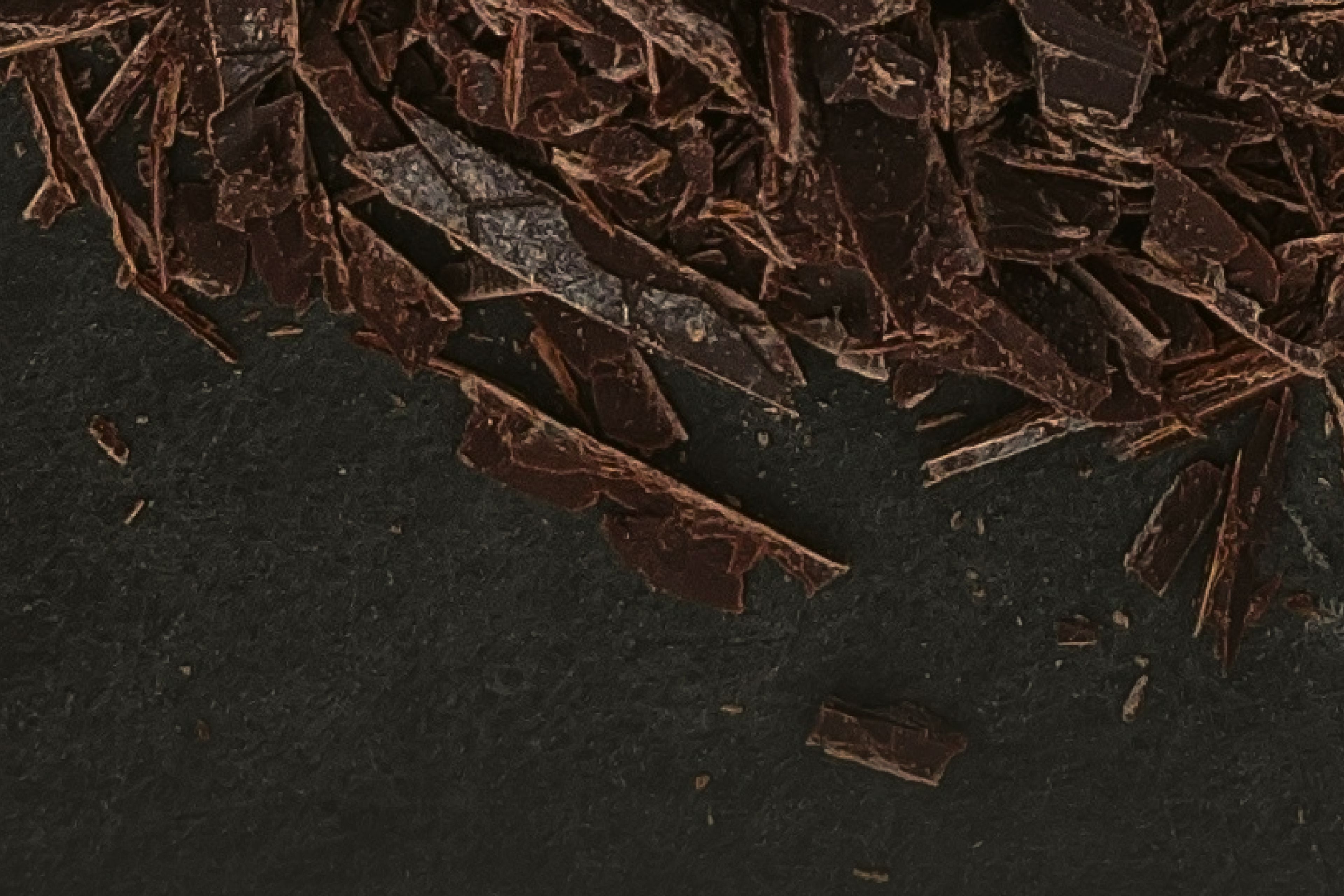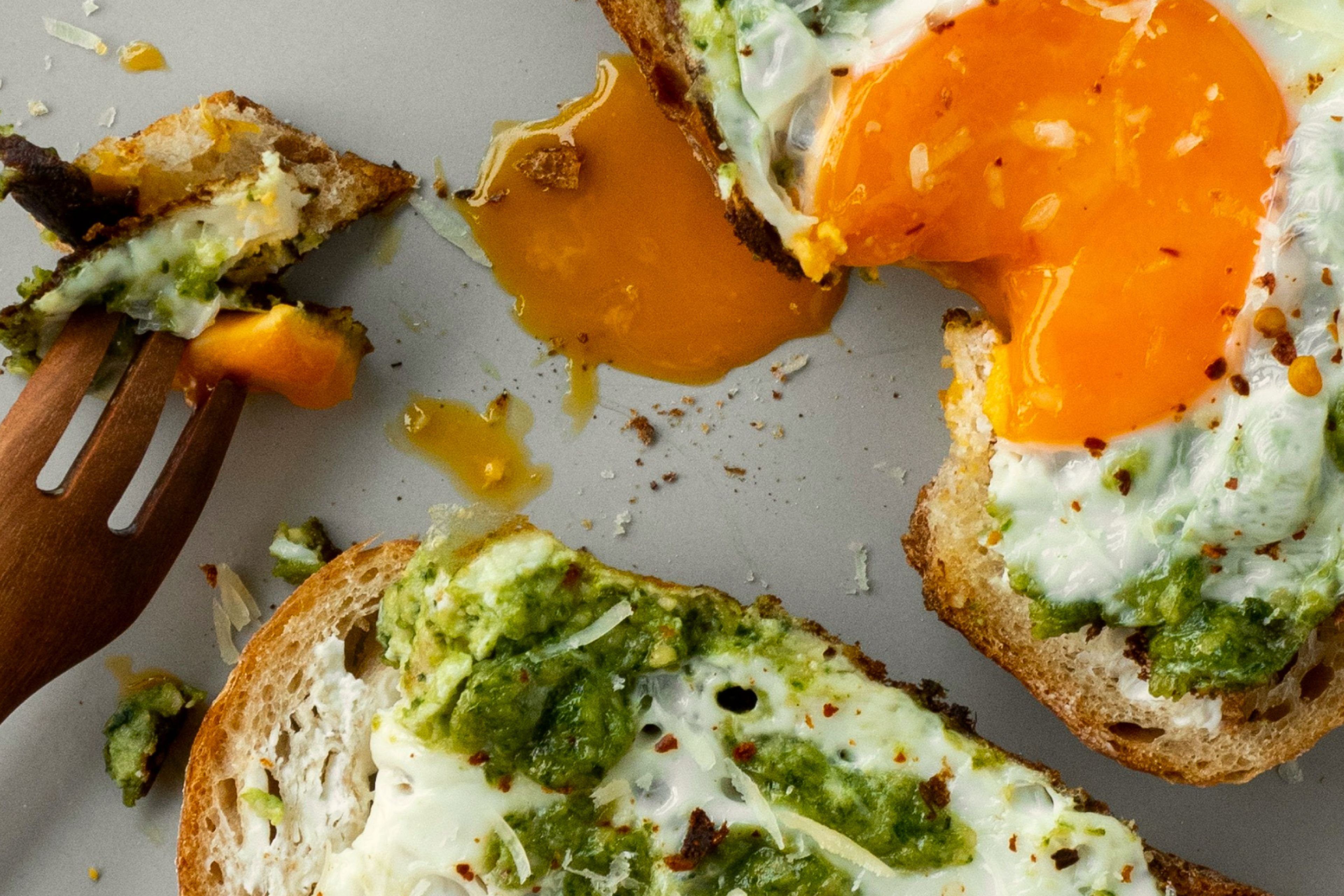The Mediterranean Diet for Longevity: A Practical Guide
Following a Mediterranean diet plan may extend your life. Learn what Mediterranean diet foods to incorporate to support health and longevity.

What to know
The Mediterranean diet supports longevity by reducing inflammation, oxidative stress, and mitochondrial damage—key drivers of aging.
Nutrient-dense staples of the Mediterranean diet like olive oil, berries, legumes, fish, and whole grains provide antioxidants, healthy fats, and fiber that protect and energize cells.
Polyphenols like ellagitannins found in Mediterranean foods help preserve mitochondrial function and limit the buildup of “zombie” cells, defective cells linked to aging.
Adopting a Mediterranean lifestyle with whole foods, shared meals, and active living offers a sustainable path to healthier aging.
The Mediterranean Diet: Fueling Cellular Health and Longevity from the Inside Out
The Mediterranean diet, with its diverse array of nutrients and flavorful cuisine options, remains the top-rated diet for health by U.S. News & World Report. However, it's far more than just a heart-healthy eating pattern or a weight management tool.
Packed with anti-inflammatory and antioxidant-rich foods that support key drivers of longevity, including improved cellular health, reduced oxidative stress, and mitochondrial health, the Mediterranean diet plan promotes healthy aging at its core — the cells.
As more people seek sustainable ways to age well, the Mediterranean diet for longevity continues to stand out as both scientifically validated and easy to follow. Let’s discuss how Mediterranean diet foods can power your cells and add healthy years to your life.
What is the Mediterranean Diet
The Mediterranean diet is a plant-forward eating pattern inspired by the traditional cuisines of countries bordering the Mediterranean Sea, including Greece, Italy, Spain, and parts of the Middle East. It emphasizes fruits, vegetables, whole grains, legumes, nuts, olive oil, and seafood, with moderate amounts of dairy and wine. This approach is celebrated for its health benefits and delicious, sustainable style of eating.

While not on the Mediterranean, other longevity hubs, known as Blue Zones, follow a similar style of eating, notably, areas in Japan, Costa Rica, and even Loma Linda, California.
How the Mediterranean Diet Supports Cellular Health
The Mediterranean diet is considered one of the best diets for longevity and supports cellular health in several key ways. Emerging science is now unlocking how this traditional eating pattern helps fuel our gut microbiome (the community of bacteria in your digestive tract), promotes cellular energy, and supports the cell’s energy centers, the mitochondria.[1]
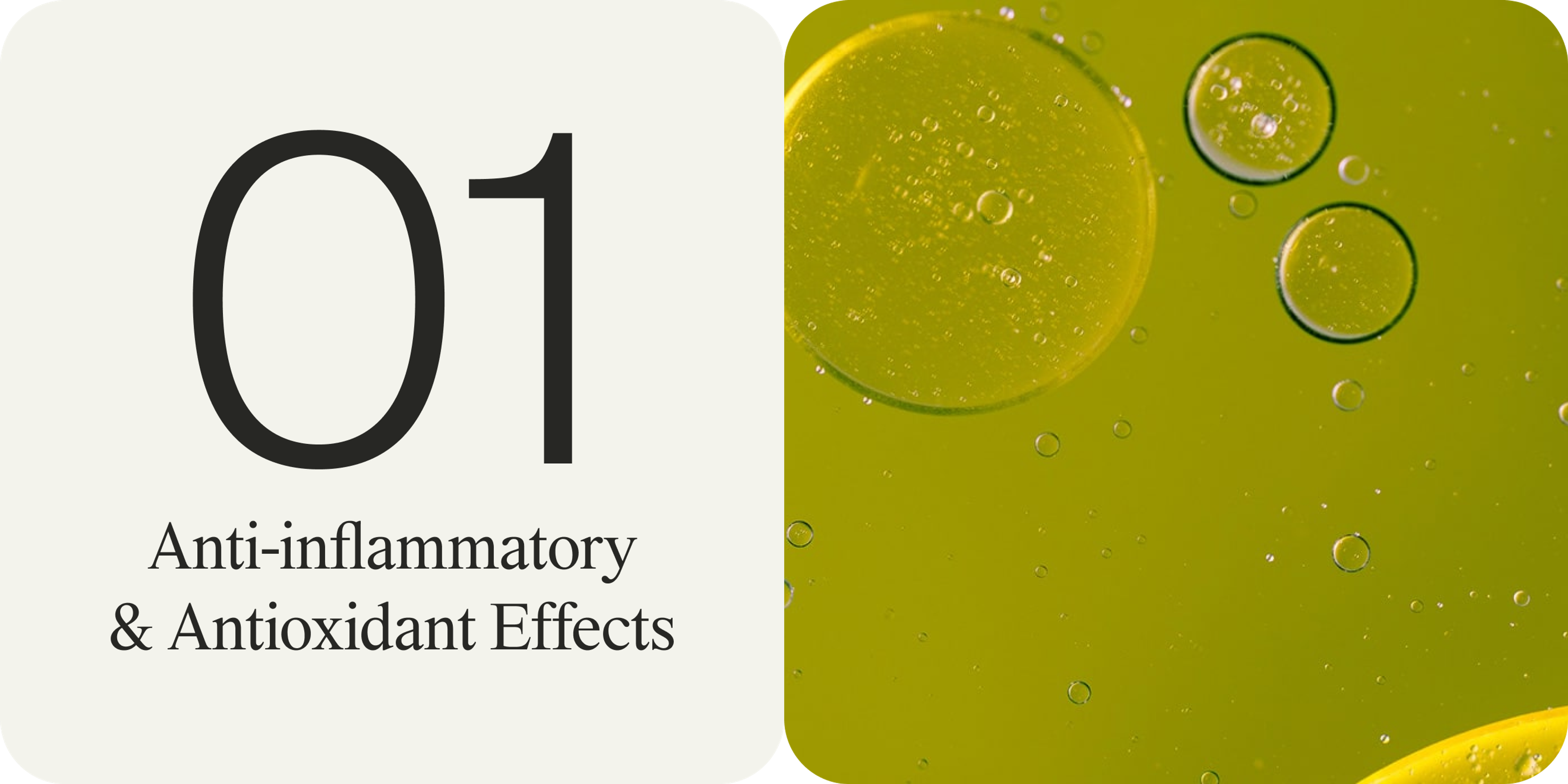
Anti-inflammatory and antioxidant effects
Chronic inflammation can impair mitochondrial function by damaging mitochondrial DNA and disrupting the mitochondria's normal energy production capabilities[2]. Incorporating aspects of the Mediterranean diet for inflammation can be beneficial, as it is associated with lower levels of inflammatory markers that play a role in cellular stress, aging, and disease progression.[3]
Extra virgin olive oil, for example, is a staple in the Mediterranean diet. It is a powerful source of monounsaturated fats and polyphenols, which have been shown to lower inflammatory markers.[4] In addition, fatty fish like salmon, sardines, and mackerel provide omega-3 fatty acids that help modulate the body’s inflammatory response.[5]
The diet is also rich in plant-based anti-inflammatory foods such as fruits, vegetables, legumes, whole grains, nuts, and seeds. These foods supply polyphenols and antioxidants, and often are seasoned with herbs and spices like turmeric, garlic, and ginger, which offer additional anti-inflammatory benefits.

Oxidative stress reduction
While mitochondria produce energy, they also generate reactive oxygen species (ROS), which can harm cells when unchecked. The nutrients in Mediterranean diet foods help combat oxidative stress, which can accelerate mitochondrial damage and early aging.
The Mediterranean diet is full of powerful polyphenols, plant compounds that neutralize ROS, helping to protect against oxidative damage.[6]In addition, research suggests higher polyphenol intake is associated with improved mitochondrial function.[7]

Urolithin A
This diet boasts a robust nutritional profile that directly supports mitochondrial function and reduces cellular stress, thereby enhancing longevity. Mediterranean superfoods, including colorful fruits, veggies, nourishing fish, and whole grains, supply fiber, lean proteins, and other key mitochondrial nutrients to support longevity.
The Mediterranean diet provides a lesser-known, but equally important nutrient that doesn’t come directly from the foods. Rather, this nutrient is derived from our gut microbiome, after the bacteria metabolize the polyphenols found in foods like pomegranates, berries, and nuts. This healthy aging nutrient is called Urolothin A.[8]
Urolithin A supports mitochondrial health by triggering a cellular recycling process, helping to clean up damaged mitochondria and promote the creation of newer, better-functioning ones. The catch? 60-70% of us don’t have the right gut microbiome to make Urolithin A.[9] Direct supplementation with a precise, clinically validated form of Urolithin A, like Mitopure®, provides optimal levels of this nutrient, without having to rely on diet (and your gut microbiome).
Clinical studies with Urolithin A have a meaningful impact on health. Taking 500 mgs of Urolithin A daily has been shown to:
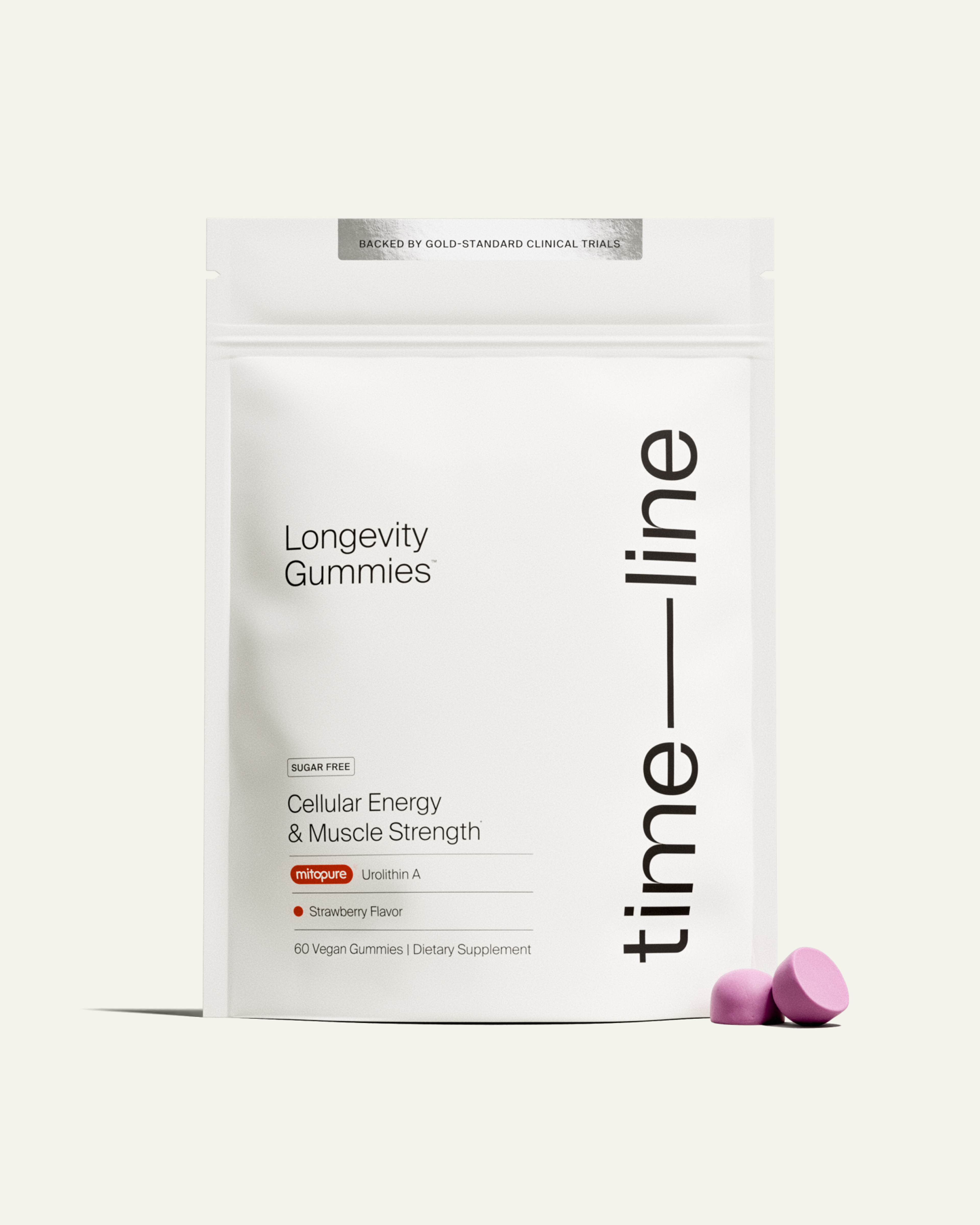
Mitopure Gummies
4.7 · 883 reviews
A strawberry-flavored dose of cellular energy

Gut health support
The Mediterranean diet also promotes gut health, which plays a crucial role in longevity and overall well-being. It’s well known that fiber supports gut health, heart health, and blood sugar levels. However, fiber from a large variety of plant-based foods directly fuels beneficial gut bacteria, producing short-chain fatty acids that reduce inflammation and may enhance mitochondrial efficiency.[13]
Mediterranean Diet and Longevity Pathways
The Mediterranean diet for longevity targets multiple hallmarks of aging, including mitochondrial dysfunction, inflammaging, and others.
Other Mediterranean diet benefits include the ability to limit the accumulation of senescent cells, often referred to as “zombie cells.” These cells are defective but don’t die, and therefore can stick around and increase inflammation.[14]
Additionally, research shows people who follow the Mediterranean diet tend to have longer telomeres, strands of DNA found throughout the body. Since shorter telomeres can contribute to the aging process, longer telomeres are associated with greater longevity.[15]
With its abundance of foods to reduce oxidative stress, support mitochondrial health, and target key aging pathways, the Mediterranean diet is the hallmark of a longevity diet.[16]
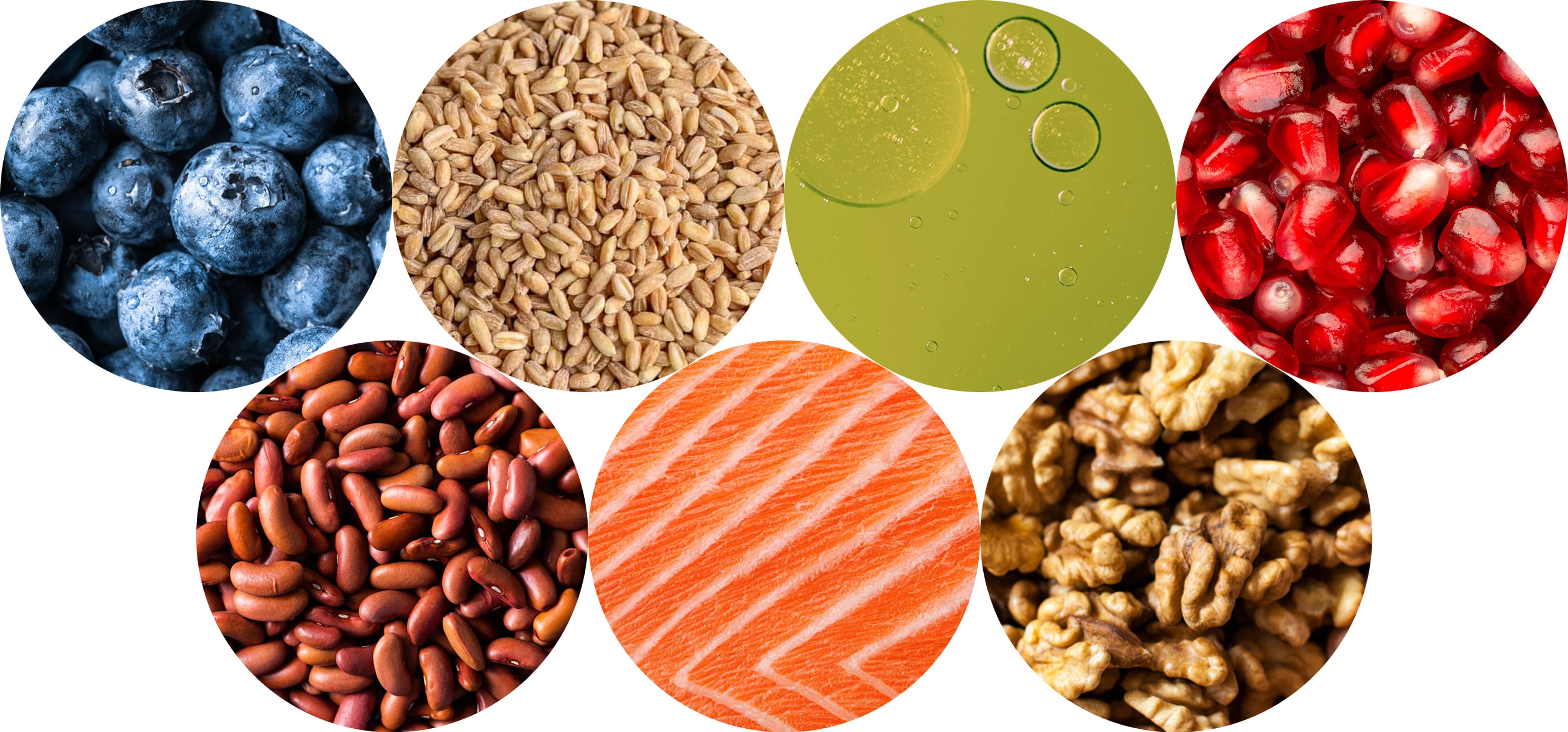
What to Eat to Power Up Your Mitochondria
While many aspects of the Mediterranean diet are healthful, an emphasis on the following antioxidant-rich foods will nourish your mitochondria and protect your cells from age-related damage.
Berries
Berries such as blueberries, blackberries, and strawberries are a key part of the Mediterranean diet and support mitochondrial health. Rich in fiber, vitamins, and anthocyanins—potent antioxidants—they help reduce inflammation, protect cells from oxidative stress, and promote more efficient energy production at the cellular level.[17]
Pomegranates
Pomegranates are rich in polyphenols—especially ellagitannins like ellagic acid—which the gut microbiome can convert into Urolithin A. While not everyone can produce Urolithin A efficiently, those who can or who take a direct dose in supplement form may experience improved mitochondrial performance and reduced cellular aging.[18]
Fatty fish
Fatty fish like salmon, sardines, and mackerel are staples of the Mediterranean diet and provide omega-3s (EPA and DHA) that support mitochondrial and metabolic health. Not into fish? Plant-based sources like flaxseeds, chia, and walnuts also offer omega-3 benefits, but you’ll have to eat more of them to get the same amount as in a smaller portion of fish.[19]
Whole grains
Whole grains like farro, bulgur, and barley, common in the Mediterranean diet, provide nutrients like B vitamins and antioxidants that fuel mitochondrial function and energy production for healthy aging and cellular repair[20]. These foods also provide your gut with fiber, helping to support a healthy microbiome.
Legumes
Legumes like beans, lentils, and peas are frequently enjoyed on the Mediterranean diet and support mitochondrial health by providing plant-based protein, fiber, and essential nutrients like magnesium and iron. These nutrients are shown to directly protect the mitochondria and improve their function, enhancing cellular health and longevity.[21]
Nuts
Nuts, such as walnuts and almonds, are commonly served as an after-dinner snack, with meals, or in desserts in the Mediterranean region. Walnuts contain polyphenols, specifically ellagitannins, which have been researched for their potential role in preventing age-related diseases, including cancer, heart disease, and neurodegenerative disorders.[22]
Olive oil
Olive oil is one of the most widely known features of the Mediterranean lifestyle - and for good reason. It contains healthy monounsaturated fats shown to reduce inflammatory markers when used as part of a balanced diet.[23]
In addition, certain spices used in Mediterranean cuisine, such as turmeric, ginger, and garlic, boast additional anti-inflammatory benefits, antioxidant, and disease-fighting properties.[24]

Practical Guide to Adopting the Mediterranean Longevity Lifestyle
Even if the Mediterranean diet feels vastly different than what you’re used to, you can bring this diet to your plate with a few simple changes. If you don’t know where to start, try these easy swaps and additions to begin to build a Mediterranean diet plan into your healthy routine.
- Swap refined grains for whole grains: Choose brown rice, quinoa, farro, or whole-grain bread instead of refined white rice or pasta. These whole grains reduce mitochondrial stress, optimizing longevity.[25]
- Adopt more plant-based eating patterns: Aim for a few meatless meals each week, using lentils, beans, or tofu to increase fiber and antioxidants that protect your mitochondria. Try a veggie-loaded stir-fry, lentil soup, or chickpea salad.
- Choose seafood more often: Aim for 2–3 servings of fish per week to protect your mitochondria. Grilled salmon, canned sardines on whole-grain toast, or tuna over a mixed greens salad are all quick and easy proteins to enjoy.
- Prioritize healthy fats: Cook with extra virgin olive oil instead of butter or margarine, and snack on nuts or seeds instead of chips when you’re craving something crunchy. An added bonus is that research suggests eating more polyunsaturated fats in these types of foods is also linked to better sleep quality.[26]
- Flavor meals with herbs and spices: Incorporate anti-inflammatory seasonings like garlic, oregano, basil, turmeric, and ginger to boost flavor and nutrition without extra salt or sugar.
Moving to a more whole-food-based diet, like this one, can also help reduce your exposure to environmental toxins in packaged foods, such as microplastics.
Wrapping Up
The Mediterranean diet is more than just a diet for heart health—it’s a powerful strategy for cellular health, mitochondrial repair, and longevity. From olive oil and berries to legumes and whole grains, the nutrient-dense foods of a Mediterranean lifestyle work together to fuel your body at the cellular level. By incorporating more of these Mediterranean diet foods, you’re not just nourishing yourself—you’re investing in a longer, healthier life from the inside out.
Authors

Written by
Dietitian-Nutritionist, and Health Content Writer

Reviewed by
Director Science Communications
References
- ↑
Pollicino F, Veronese N, Dominguez LJ, Barbagallo M. Mediterranean diet and mitochondria: New findings. Experimental Gerontology. 2023;176:112165. doi:https://doi.org/10.1016/j.exger.2023.112165
- ↑
Nesci S, Spagnoletta A, Oppedisano F. Inflammation, Mitochondria and Natural Compounds Together in the Circle of Trust. Int J Mol Sci. 2023;24(7):6106. Published 2023 Mar 24. doi:10.3390/ijms24076106
- ↑
Bonaccio M, Costanzo S, Di Castelnuovo A, et al. Increased Adherence to a Mediterranean Diet Is Associated With Reduced Low-Grade Inflammation after a 12.7-Year Period: Results From the Moli-sani Study. J Acad Nutr Diet. 2023;123(5):783-795.e7. doi:10.1016/j.jand.2022.12.005
- ↑
Santangelo C, Vari R, Scazzocchio B, et al. Anti-inflammatory Activity of Extra Virgin Olive Oil Polyphenols: Which Role in the Prevention and Treatment of Immune-Mediated Inflammatory Diseases?. Endocr Metab Immune Disord Drug Targets. 2018;18(1):36-50. doi:10.2174/1871530317666171114114321
- ↑
Poggioli R, Hirani K, Jogani VG, Ricordi C. Modulation of inflammation and immunity by omega-3 fatty acids: a possible role for prevention and to halt disease progression in autoimmune, viral, and age-related disorders. Eur Rev Med Pharmacol Sci. 2023;27(15):7380-7400. doi:10.26355/eurrev_202308_33310
- ↑
Lin X, Liu W, Hu X, Liu Z, Wang F, Wang J. The role of polyphenols in modulating mitophagy: Implications for therapeutic interventions. Pharmacological Research. 2024;207:107324. doi:https://doi.org/10.1016/j.phrs.2024.107324
- ↑
Mthembu SXH, Dludla PV, Ziqubu K, et al. The Potential Role of Polyphenols in Modulating Mitochondrial Bioenergetics within the Skeletal Muscle: A Systematic Review of Preclinical Models. Molecules. 2021;26(9):2791. Published 2021 May 10. doi:10.3390/molecules26092791
- ↑
D'Amico D, Andreux PA, Valdés P, Singh A, Rinsch C, Auwerx J. Impact of the Natural Compound Urolithin A on Health, Disease, and Aging. Trends Mol Med. 2021 Jul;27(7):687-699. doi: 10.1016/j.molmed.2021.04.009. Epub 2021 May 21. PMID: 34030963.
- ↑
Singh, A., D’Amico, D., Andreux, P.A. et al. Direct supplementation with Urolithin A overcomes limitations of dietary exposure and gut microbiome variability in healthy adults to achieve consistent levels across the population. Eur J Clin Nutr 76, 297–308 (2022). https://doi.org/10.1038/s41430-021-00950-1
- ↑
Andreux, P.A., Blanco-Bose, W., Ryu, D. et al. The mitophagy activator urolithin A is safe and induces a molecular signature of improved mitochondrial and cellular health in humans. Nat Metab 1, 595–603 (2019). https://doi.org/10.1038/s42255-019-0073-4
- ↑
Andreux, P.A., Blanco-Bose, W., Ryu, D. et al. The mitophagy activator urolithin A is safe and induces a molecular signature of improved mitochondrial and cellular health in humans. Nat Metab 1, 595–603 (2019). https://doi.org/10.1038/s42255-019-0073-4
- ↑
Singh A, D'Amico D, Andreux PA, Fouassier AM, Blanco-Bose W, Evans M, Aebischer P, Auwerx J, Rinsch C. Urolithin A improves muscle strength, exercise performance, and biomarkers of mitochondrial health in a randomized trial in middle-aged adults. Cell Rep Med. 2022 May 17;3(5):100633. doi: 10.1016/j.xcrm.2022.100633. PMID: 35584623; PMCID: PMC9133463.
- ↑
Kassan M, Kwon Y, Munkhsaikhan U, et al. Protective Role of Short-Chain Fatty Acids against Ang- II-Induced Mitochondrial Dysfunction in Brain Endothelial Cells: A Potential Role of Heme Oxygenase 2. Antioxidants (Basel). 2023;12(1):160. Published 2023 Jan 10. doi:10.3390/antiox12010160
- ↑
National Institute on Aging. Does cellular senescence hold secrets for healthier aging? National Institute on Aging. Published July 13, 2021. https://www.nia.nih.gov/news/does-cellular-senescence-hold-secrets-healthier-aging (https://www.nia.nih.gov/news/does-cellular-senescence-hold-secrets-healthier-aging)
- ↑
Canudas S, Becerra-Tomás N, Hernández-Alonso P, et al. Mediterranean Diet and Telomere Length: A Systematic Review and Meta-Analysis. Adv Nutr. 2020;11(6):1544-1554. doi:10.1093/advances/nmaa079
- ↑
Andreo-López MC, Contreras-Bolívar V, Muñoz-Torres M, García-Fontana B, García-Fontana C. Influence of the Mediterranean Diet on Healthy Aging. Int J Mol Sci. 2023;24(5):4491. Published 2023 Feb 24. doi:10.3390/ijms24054491
- ↑
Pap N, Fidelis M, Azevedo L, et al. Berry polyphenols and human health: evidence of antioxidant, anti-inflammatory, microbiota modulation, and cell-protecting effects. Current Opinion in Food Science. 2021;42:167-186. doi:https://doi.org/10.1016/j.cofs.2021.06.003 (https://doi.org/10.1016/j.cofs.2021.06.003)
- ↑
D'Amico D, Andreux PA, Valdés P, Singh A, Rinsch C, Auwerx J. Impact of the Natural Compound Urolithin A on Health, Disease, and Aging. Trends Mol Med. 2021 Jul;27(7):687-699. doi: 10.1016/j.molmed.2021.04.009. Epub 2021 May 21. PMID: 34030963.
- ↑
Natto ZS, Yaghmoor W, Alshaeri HK, Van Dyke TE. Omega-3 Fatty Acids Effects on Inflammatory Biomarkers and Lipid Profiles among Diabetic and Cardiovascular Disease Patients: A Systematic Review and Meta-Analysis. Scientific Reports. 2019;9(1). doi:https://doi.org/10.1038/s41598-019-54535-x
- ↑
Milesi G, Rangan A, Grafenauer S. Whole Grain Consumption and Inflammatory Markers: A Systematic Literature Review of Randomized Control Trials. Nutrients. 2022;14(2):374. Published 2022 Jan 16. doi:10.3390/nu14020374
- ↑
Zheng Q, Wang F, Nie C, et al. Elevating the significance of legume intake: A novel strategy to counter aging‐related mitochondrial dysfunction and physical decline. Comprehensive Reviews in Food Science and Food Safety. 2024;23(3). doi:https://doi.org/10.1111/1541-4337.13342
- ↑
Sánchez-González C, Ciudad CJ, Noé V, Izquierdo-Pulido M. Health benefits of walnut polyphenols: An exploration beyond their lipid profile. Crit Rev Food Sci Nutr. 2017;57(16):3373-3383. doi:10.1080/10408398.2015.1126218
- ↑
Fernandes J, Fialho M, Santos R, et al. Is olive oil good for you? A systematic review and meta-analysis on anti-inflammatory benefits from regular dietary intake. Nutrition. 2020;69:110559. doi:10.1016/j.nut.2019.110559
- ↑
Yu X, Pu H, Voss M. Overview of anti-inflammatory diets and their promising effects on non-communicable diseases. Br J Nutr. 2024 Oct 14;132(7):898-918. doi: 10.1017/S0007114524001405. Epub 2024 Oct 16. PMID: 39411832; PMCID: PMC11576095.
- ↑
Pollicino F, Veronese N, Dominguez LJ, Barbagallo M. Mediterranean diet and mitochondria: New findings. Experimental Gerontology. 2023;176:112165. doi:https://doi.org/10.1016/j.exger.2023.112165
- ↑
Wilson K, St-Onge MP, Tasali E. Diet Composition and Objectively Assessed Sleep Quality: A Narrative Review. Journal of the Academy of Nutrition and Dietetics. 2022;0(0). doi:https://doi.org/10.1016/j.jand.2022.01.007



